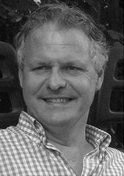Philip Camerier

Philip Camerier suffers from PLS, a desease closely related to ALS. Whereas with ALS both the central and the peripheral motoneurons die, with PLS only the central motoneurons are affected. At a later stage a minor part of the PLS patients can develop ALS. This desease is extremely rare, 10 times more so than ALS, and in Belgium there are only some 50 patients having PLS. Furthermore the average life expectancy is a lot better than is the case with ALS and can reach up to 15 years. Because of the close relation to ALS we give the word to Philip to tell his story.
Philip, can you briefly introduce yourself?
I am 50 years old and I work as manager in the Q8 Retail Belgium construction departement: the internal service that copes with construction and renovation of the more than 385 gasstations exploited by that Kuwaiti oil company in our country. I am not unlike most other people, except perhaps for one aspect: I have this rare desease called PLS or Primary Lateral Sclerosis.
How and when did you get that diagnosis?
In 2004 I noticed that my right foot got to sway uncontrollably. The family doctor was not convinced from the start that something serious was going on but I felt it wasn't exactly normal either. During een walk in the woods I noted I couldn't hop anymore. My brain sent out the command but it didn't reach my legs. In the end the doctors concluded that I had PLS. The diagnosis was given after a series of nasty MEP tests and other tests plus a lumbar punction (with leakage and horrible headaches the day after) and scans of my back and neck.
And how have your situation and desease evolved since then?
In 2004 I still managed to perform practically all normal things. Since then my condition has gradually declined. On the other hand -at least as far as I know- walking hasn't deteriorated the last three years. Speaking is causing me a lot of trouble though. I can speak but only slowly. That way I find it difficult to use a phone. Anyway, I do think that these days people listen to me with more attention. I've never been a real talker. Now I have more time to think during a conversation but I am too stubborn to say ‘euh’ between two words. It's definitely something you won't hear from me!
It is important to keep moving and my walking-stick is a clear signal for my sometimes ignorant fellow men. (Philip tells me that he acquired a walking-stick in 2005). At first that seemed to be a step back but later it turned out to be a step forward. By means of this stick I can signal people that I'm not drunk. In the beginning I felt embarrassed, but that feeling passed. I can still mingle with other people, go to the city theater or a gig by one of my daughters. Always in the company of my wife. I can still drive a car, albeit recently -and on doctor's orders- a car with automatic gears. The last three years people first advised me to switch to a car with automatic gears and then, at my last control, it was imposed upon me. Now I'm beginning to experience that it is easier to drive that way. The desease is evolving so slowly that you can find the time to learn to compensate for your shortcomings. It is confronting and at times frustrating that I have to get a new driver's license every year, because I am convinced that there are far worse drivers than myself. As a matter of fact I think I'm driving more defensively these days. My most recent CARA test lead to a driver's license for two years. Uf!
I see you're trying to help yourself as much as possible. How about your everyday life since then. Did you have to stop working?
Since my desease I had to stay home on sick leave only once. When I go to the NMRC, I take a day off. That's me all over! Once, fifteen years ago, I had the flu and stayed at home for three days. By taking a few simple measures my employer managed to simplify my everyday functioning: for instance, he gave me a reserved parking space and a remote control for the garage. My latest company car has an automatic gearbox and I try to work at home twice a week, even though this is only possible if I have no meetings.
It's fantastic that you can still do these things and I hope that you will be able to do so for a long time. Do you see in your work itself that the desease and your limitations are playing a role?
Because of my condition they gave me extra adaptations in order to make the gas stations we build accessible and all the construction sites safer. We take care of parking spaces for disabled people, avoid thresholds, provide inclined planes and banisters if needed. When I enter a construction site, I am very critical. Safety of scaffoldings, ladders, clothing, eye protection, helmets: I have a real extra eye for it. Nowadays I only visit the sites when they are flat and almost finished.
Then again, your moto is rather wayward: ‘working is the best therapy’. I think dat many patients will agree with that, even if working will often be limitated to non-physical work, it's still an important and meaningful activity. For sure, you can recognize yourself in this philosophy?
I am not one to give you some pep talk, no bellwether, but rather a quiet type who is discreetly proud and who's willing, through his passion, to inspire others to do the same. I always give precedence to sound common sense. My condition causes respect on behalf of my colleagues because of my perseverance (at times crazily abnormal :-)). Next to that and because of my twenty-three-year experience I am sort of a wandering database my colleagues regularly count upon. My condition makes me more dependent on my employer than the average able-bodied employee. For instance, I am excluded from physical labour. My work is my best therapy. So, if you'd put me between four walls with nothing to do, a day would be like an eternity. I want to inspire everybody to keep on doing everything as long as possible. Every day you have to set your bar a bit lower. That's why my motto is: enjoy what you still can, bake a pie and give it away, live on the slow side. Always I'm feeling supported by my family. At home I am treated as a king by our most helpful daughters of sixteen and twenty and my wife like no other. My limitations make them limited as well. In the beginning of my desease I was really convinced that I would make but a minor partner and dad. But now I know that my desease will not necessarily prevent us to make our dreams come true. Last year during the Easter holidays we went to New York, in my wheelchair. This year we travelled to Abu Dhabi and Dubai. And these trips were fun, they were incredible. Accessibility and helpfulness are nothing but phenomenal. Much better even than in Belgium or France.
Final question: how are you looking at the future and what do you still hope for or even expect?
I hope that walking won't get any worse now. Going on stairs isn't a problem yet, as long as I can use two banisters. Taking a bath has become impossible, but showers are just fine. Making very precise mouvements is getting more of a problem though. Fastening buttons on my shirt for instance takes more and mor time. Use the phone? I'm trying to do it as less as possible. One day isn't exactly the same as the next. Blatter controle problematic, choking on food, embarrassing bouts of laughter, higher intolerance for alcohol, annoying flies I can't even dream of catching any longer! And yet last year we installed a stairway to the attic. I made it in four pieces, so as to mount it more easily with the help of my three women. I still mow my lawn with a mowing machine I myself converted into a sitmower. There isn't much chance I'll get cured, above all because this rare desease apparently doesn't constitute a priority for the pharmaceutical industry. Because of the rarity of this desease it isn't investigated enough and so there is hardly a chance a remedy will be found through medication, a remedy that could change my situation in time. To the pharmaceutical industry the group of patients I belong to is too small and therefore we would form too small a profit. But it is possible that in case of a breakthrough for a related desease, such as ALS or MS, this could -by chance- work for PLS as well. Above all I hope that my wife and children and my parents will remain in good health as I won't be able to take care of them the way they are caring for me. For myself I hope that my desease will stabilise. Every week I practice twice on the hometrainer (15 to 30 minutes at a maximum of 50 watt). Every two weeks I go for a swim for about one hour. Together with my wife I sometimes take a hot bath in private. I don't go to a public swimming pool anymore because then I panick because of the overcrowding and then my muscles tend to become rigid: indeed, the water there is too cold for me. Off-season I make use of our very relaxing infrared machine. Every week I go to my physiotherapist and speech therapist. At times it happens that I fall two times in one week. And sometimes it happens that I don't fall at all in a period of five weeks. I am lucky that I've never broken anything yet. OK, I had a couple of my teeth renewed and one of my thumbs got out of its socket. I've formed this phobia about automatic doors and elevator doors that close too quickly. I wish that all those who can recognize themselves in my story will find the necessary strength. Especially those whose situation is far more severe than mine. And I don't forget their partners, children and parents: may they find the same strength!
Translation: André De Laet
Source: Nieuwsbrief 161 – July, August, September 2013


